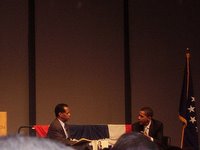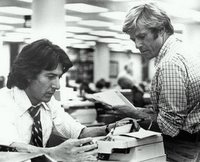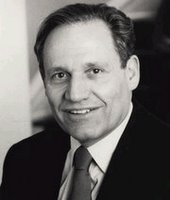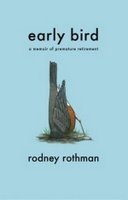 When I grow up, I don't want to be an astronaut or a ballerina. I want to be Amy Sedaris. She's charming, she's a little demented, and she's hilarious. So until the day I get those proportions right, I'll just have to settle for her recipes and tips on entertaining properly.
When I grow up, I don't want to be an astronaut or a ballerina. I want to be Amy Sedaris. She's charming, she's a little demented, and she's hilarious. So until the day I get those proportions right, I'll just have to settle for her recipes and tips on entertaining properly....Which, to be sure, are pretty entertaining. Not many people could get away with making a book half-parody and half-cookbook, but Ms. Sedaris manages it. The book itself is pretty simple: it's a series of tips, recipes, and short essays on entertaining. The practical stuff got a little repetitive, especially as I got further in the book and realized that I'll never actually throw the number of dinner parties it would take to use the full breadth of the Sedaris planning techniques. I think she realizes that, though, and moves from topics like shopping for a party to more exotic things like entertaining the infirm and cooking like a hobo. Possibly the most useful section is the one that discusses how to cook while under the influence. That alone is probably worth the cover price.
The "look" of the whole thing is very 1970s. When I was little, I loved looking through my mom's old cookbooks and stuff. It all seemed very elegant. Then time passed, and I realized that a) nothing in life ever, ever comes on a doily, and 2) food just isn't supposed to look like that. So now, in these days of photographs that make food look edible, and lighting that doesn't turn everything reddish brown, the old-school choice seems bold and artistic. Or something. The photos are hilarious, from the polyester dresses to the Betty Crocker stylized facial expressions and the general 1974 joie de vivre. Of course, since this is Amy Sedaris, said joie de vivre also includes a bong, crappy vegetable craft projects, and crying children.
But while the pictures keep everything afloat, the best parts are the random tips and observations. A few of my favorites:
"There is much one can do to remove a urine stain from a mattress. Vinegar can remove odors, but because this is a moisture problem, I suggest dragging your mattress out into the sun. But realize that you're not only airing a mattress, you're airing your dirty laundry as well."
 Under "Children's Games": "Play Grown-Up. Have a cocktail party. Make fake liquor using food coloring....Pretend French fries with the tips dipped in ketchup are lit cigarettes. Have children simulate spousal abuse by arguing and, as this escalates, slapping each other. Use Tic Tacs to spit out of the mouth as if they were teeth. Use red Tic Tacs if you want to pretend they are bloody teeth. If there is an infant in the house, it's always fun to play Social Services. Have one child pretend he is going to take the baby away from another child. The pretend 'mother' can fight for custody....Have a child pretend he is walking in on his wife and catching her having an affair with another person."
Under "Children's Games": "Play Grown-Up. Have a cocktail party. Make fake liquor using food coloring....Pretend French fries with the tips dipped in ketchup are lit cigarettes. Have children simulate spousal abuse by arguing and, as this escalates, slapping each other. Use Tic Tacs to spit out of the mouth as if they were teeth. Use red Tic Tacs if you want to pretend they are bloody teeth. If there is an infant in the house, it's always fun to play Social Services. Have one child pretend he is going to take the baby away from another child. The pretend 'mother' can fight for custody....Have a child pretend he is walking in on his wife and catching her having an affair with another person."[Editrix's note: Didn't every kid have scenarios like this when they played imaginary games? No? Just me? Okay then.]
On dating: "If you're the one leaving: Pack an overnight bag, you don't want to be seen walking the beltline in a Greek dress the next morning. Don't leave a piece of jewelry at his house so you can go back and get it later; he may be with his real girlfriend.
If he's the one staying: Pack the medicine chest. Trojans.
If you end up spending a lot of time in bed together with nothing to do, quiz each other on all the state capitals, then move on to learning 10 new vocabulary words a night. Good times. Frigid, incontinent, impudent, Clydesdale, vaginitis, homosexual, ennui, ampersand, charcuterie, abstinence."
So even though I will probably never have the swingin' parties that Amy is probably having right this second, it's clear that I have much to learn to get through life with a modicum of grace. And somehow I don't think I'll find it in any Martha Stewart magazine, so Hospitality Under the Influence it is, then.









